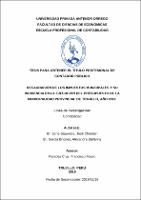Recaudación de los impuestos municipales y su incidencia en la ejecución del presupuesto de la Municipalidad Provincial de Trujillo, año 2018

View/
Download
(application/pdf: 4.815Mb)
(application/pdf: 4.815Mb)
Date
2019Author(s)
Eche Saavedra, José Christian
García Briones, Alexandra Stefanny
Metadata
Show full item recordAbstract
La presente investigación tuvo como objetivo demostrar la incidencia de la
recaudación de los Impuestos Municipales en la Ejecución del Presupuesto de la
Municipalidad Provincial de Trujillo, año 2018. El diseño de esta investigación fue
de tipo explicativo – causal donde se analizó la recaudación de los impuestos
municipales y demostrar su incidencia en la Ejecución del Presupuesto. La
población estuvo conformada por la Gerencia de Administración y Finanzas con sus
respectivas Sub gerencias de Tesorería y Contabilidad, donde se aplicó análisis
documental, se trabajó con reportes de recaudación de Impuestos que emite la Sub
Gerencia de Tesorería. Se organizaron los datos en Excel para su mejor
presentación. Por otro lado la ejecución de ingresos alcanzo el 97% con respecto
al Presupuesto Institucional Modificado. En relación al nivel de recaudación por
conceptos de Impuestos Municipales el mayor ingreso se obtuvo del Impuesto
Predial con un monto de S/ 39’059,585.00. y que la Ejecución del Gasto se ejecutó
el 91% con respecto al monto presupuestado donde la Genérica Personal y
Obligaciones sociales fue el de mayor monto ejecutado con S/ 28´345,172 seguida
de la genérica bienes y servicios con un monto de S/ 25’373,688; finalmente al
aplicar un indicador de eficacia de la Ejecución de Gastos entre la Ejecución de
Ingresos, existe una incidencia significativa de la recaudación de los Impuestos
Municipales obteniendo una eficacia optima de 97%, la cual nos indica que la
recaudación de los Impuestos Municipales incide de manera significativa en la
Ejecución del Presupuesto de la Municipalidad Provincial de Trujillo , año 2018. The purpose of this research work is to determine how the application of the General
Sales Tax affects the sale of future properties in the liquidity of the company. Its
development includes the study of the problematic reality, which originates with the
provisions of Legislative Decree No. 1116 and specifically of article 3 paragraph
where it indicates the treatment of VAT in future sales of real estate,
Our research according to the orientation is applied, and according to the contrast
technique, it is explanatory. We worked with the sample that is constituted by the
sales of future real estate made by the company, seeking to explain its impact on
liquidity. The analysis consisted of comparing the advances received from
customers with the application of the VAT and without the application of the VAT,
determination and payment of the VAT, advances vs. monthly work budget,
comparative balance to assess the differences in cash and ratios to assess the
situation Economic and financial company.
The result obtained shows that there is an impact on the liqui dity of the company
with the VAT application, in the sale of future properties, it was found that there is a
decrease in cash of S/. 236,312.00 since in order to meet its obligations normally it
would resort to loans with the suppliers, bank loans and would be in constant search
for financing to cover the activities which makes the company's profitability decrease
generating cost overruns. For which it is necessary that when tax rules are dictated,
it is evaluated how they affect business planning, and their impact in all its aspects,
so as not to affect liquidity in companies.
Collections
- Contabilidad [485]

